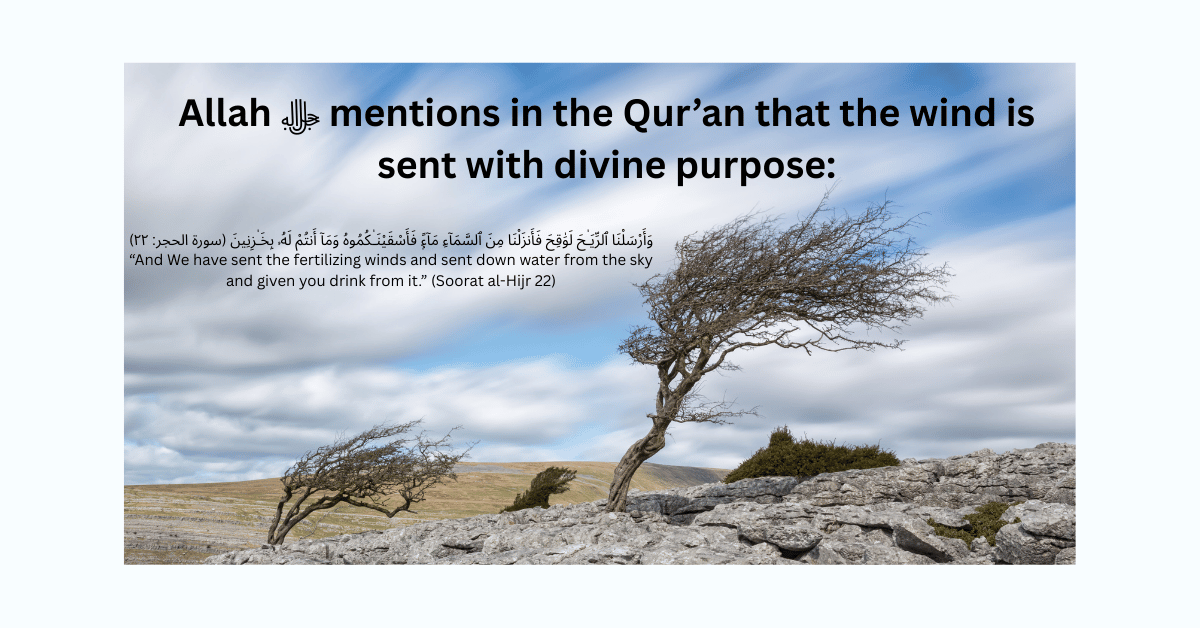Prophet Muhammad on Windstorms: Qur’an, Hadith & Du’aa
The Prophet ﷺ used to make du’aa for the good of a windstorm.
What did the Prophet Muhammad ﷺ say when there was a windstorm?
Introduction
The wind is one of the most powerful creations of Allah ﷻ. It carries life-giving rain, spreads pollen, and balances nature. But it can also be a force of destruction when Allah wills. The Qur’an and Sunnah guide Muslims on how to view and respond to windstorms—not with curses or anger, but with remembrance of Allah, patience, and du’aa.
In this article, we’ll explore:
- Qur’anic verses about the wind.
- Prophetic hadiths on windstorms.
- The du’aa Prophet Muhammad ﷺ recited.
- Lessons Muslims can apply today.
1. Qur’anic Guidance on the Wind
Allah ﷻ mentions in the Qur’an that the wind is sent with divine purpose:
وَأَرْسَلْنَا ٱلرِّيَـٰحَ لَوَٰقِحَ فَأَنزَلْنَا مِنَ ٱلسَّمَآءِ مَآءًۭ فَأَسْقَيْنَـٰكُمُوهُ وَمَآ أَنتُمْ لَهُۥ بِخَـٰزِنِينَ (سورة الحجر: ۲۲)
“And We have sent the fertilizing winds and sent down water from the sky and given you drink from it.” (Soorat al-Hijr 22)
This verse shows that wind brings life by carrying rain, which is essential for survival. It reminds us that the wind does not blow randomly—it is commanded by Allah ﷻ.
2. The Prohibition of Cursing the Wind
During the time of the Prophet ﷺ, a man cursed the wind when it blew away his cloak. The Prophet ﷺ corrected him, saying:
“Do not curse it, for it is under command, and if anyone curses a thing without a reason, then the curse returns upon him.” (Reported in Abu Dawood)
This powerful hadith teaches us two lessons:
- The wind is a creation of Allah ﷻ and follows His command.
- Cursing the wind is useless and sinful; instead, we should respond with du’aa and patience.
3. The Prophetic Du’aa for Windstorms
When strong winds blew, Prophet Muhammad ﷺ recited a du’aa seeking goodness and protection:
قال رسول الله ﷺ :
اللهُمَّ إِنِّي أَسْأَلُكَ خَيْرَهَا وَخَيْرَ مَا فِيهَا وَخَيْرَ مَا أُرْسِلَتْ بِهِ وَأَعُوْذُ بِكَ مِنْ شَرْهَا وشَرُ مَا فِيْهَا وَشَرِّ مَا أُرْسِلَتْ بِهِ
(رواه البخاري ومسلم والترمذي)
“O Allah, I ask You for its goodness, the good within it, and the good it was sent with. And I seek refuge with You from its evil, the evil within it, and the evil it was sent with.”
(Narrated in Tirmidhi, Al-Bukhari, and Muslim)
This du’aa reflects the Prophet’s ﷺ wisdom—acknowledging that wind can bring both mercy and hardship. Muslims are encouraged to recite this whenever faced with strong winds or storms.
4. Why Windstorms Are a Test from Allah
The wind is a sign of Allah’s power. At times, it brings mercy—such as rain for crops. At other times, it becomes a test—such as hurricanes or tornadoes.
Muslims understand that:
- Every storm is decreed by Allah ﷻ.
- Wind can be a source of blessing (rain, pollination, cooling).
- Wind can be a trial (destruction, hardship).
Instead of fear or curses, believers respond with:
- Du’aa (supplication).
- Tawakkul (trust in Allah).
- Sabr (patience).
5. Lessons We Learn from the Sunnah
From the Qur’an and Sunnah, we gain practical guidance:
- The wind blows only by Allah’s command.
- Cursing the wind is forbidden.
- The Prophet ﷺ made du’aa for the good of the wind.
- Muslims are taught to seek refuge from harm during storms.
- Natural phenomena are reminders of Allah’s might and wisdom
Related Resource
For more du’as for relief and protection during calamities, check out this helpful guide from Yaqeen Institute.







